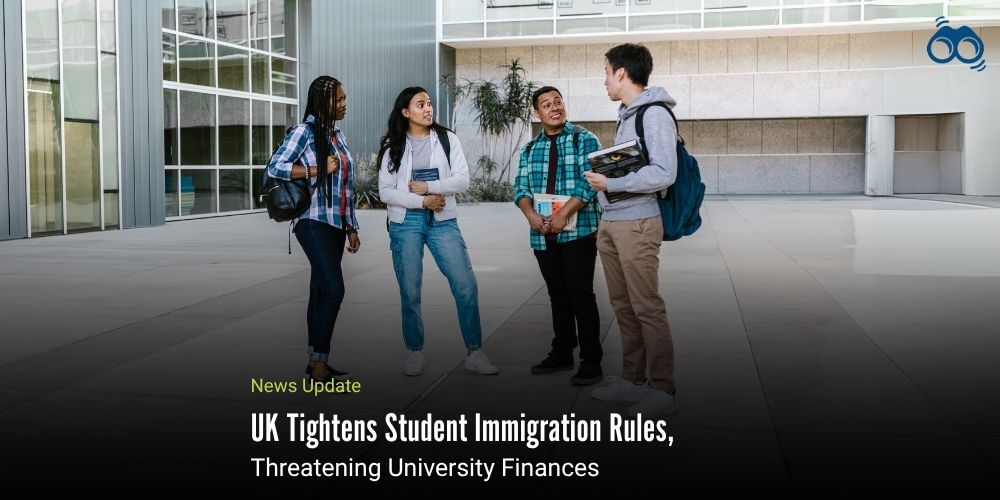Government Prioritises Immigration Control Over Higher Education Funding
New Visa Restrictions and Fees Could Challenge UK Universities’ Financial Stability
The UK government has introduced new immigration control measures, significantly affecting international students. According to a recently published white paper, these changes include reducing the post-graduation stay period for most students from 24 months to 18 months. Additionally, universities may face stricter sponsorship regulations, particularly those with high dropout rates. Furthermore, a 6% levy on the income universities earn from international students has been proposed, potentially impacting institutions dependent on this revenue.
Universities have expressed concerns that these measures could exacerbate financial difficulties. Despite their warnings, the government appears to prioritise immigration reduction over higher education support. British universities play a crucial role in strengthening the country’s global influence and export revenue. After last year’s general election, Science Minister Peter Kyle assured that the Labour government would adopt a more supportive stance toward international students, in contrast to what he described as the previous Conservative administration’s hostile approach.
One of the motivations behind these changes is believed to be the rising influence of nationalist parties opposing immigration in countries that traditionally attract international students. In the UK, however, an additional factor appears to be the government’s aim to reform the higher education sector. Notably, two weeks before the white paper’s release, the Reform Party reportedly gained control of ten local authorities across England, securing 677 seats. This development has raised concerns among the Labour government.
The Reform Party has been vocal about immigration’s impact on communities and wages. Since international students contribute to immigration figures and often remain in the country to work after graduating, they have come under scrutiny. Like similar parties in the US and Netherlands, the Reform Party attracts support from non-graduates and, when in power, tends to cut university funding while reducing international student numbers.
However, this trend is not exclusive to nationalist or right-wing parties. In Canada and Australia, both Liberal and Labour governments signalled plans to cap international student numbers ahead of recent elections. Similarly, the UK’s Labour Party appears to be following this approach to reassure voters who are more concerned about immigration than university finances. Moreover, the UK government has argued that employers depend excessively on migrant labour, while universities rely too heavily on international students. As a result, it is urging employers to invest in domestic skills and encouraging universities to offer courses that better prepare students for the future workforce.
The white paper highlights a longstanding lack of coordination and investment in skill development, despite its growing importance for employment and economic growth. In England, higher education is largely funded through student loans, which pressures universities to cater to student demand rather than national priorities. Following years of slow economic growth, approximately 10% of graduates now earn just above the minimum wage. To address these concerns, the previous government promoted apprenticeships over university degrees and allowed the real value of student loans and tuition fees to decline. In response, universities increasingly relied on international students, particularly one-year postgraduate students from Nigeria and India, who often bring their families and stay to work, contributing to rising immigration figures.
Recent adjustments to family visa rules, along with global economic and geopolitical uncertainties, have led universities to project a 21% decline in new international student enrollments this year, with 44% anticipating financial deficits. Although the current government, unlike its predecessor, has allowed UK tuition fees to rise with inflation for the first time since 2017, it expects universities to enhance efficiency and prioritise courses aligned with national needs rather than relying predominantly on international student income.
Given that higher education is primarily funded by student fees, there are limited direct mechanisms to influence universities. The Office for Students has been instructed to focus on quality assurance and financial risks, with reduced funding for strategic initiatives. However, the white paper outlines three major measures: reforming the apprenticeships levy to allow more flexible workforce investment, tightening sponsorship criteria to attract high-skill international students, and imposing a levy on international student income to support priority areas.
The first of these measures is reportedly already underway with the establishment of Skills England, a new body to determine workforce development priorities. This investment may be partially funded through the proposed levy on international student income, although Australia’s experience suggests implementation challenges. Despite these potential difficulties, the government remains committed to higher education reform. While the proposed immigration policies aim to regulate student migration and ensure institutional accountability, they also raise significant concerns about their long-term impact on university finances, international student enrollment, and broader workforce development.
Editor’s Note:
The UK government’s new immigration plans show a big policy change, focusing more on controlling migration than supporting universities financially. While it’s true that the country relies on international students and migrant workers, the proposed rules, like stricter visa requirements and shorter post-study work time, could discourage talented students from coming to the UK. This might hurt the country’s future in education, research, and economic growth. The planned tax on universities’ income from international students could also make financial problems worse, forcing universities to raise fees or cut important courses. This policy shift reflects a wider trend seen in other countries, where reducing immigration is often more important than investing in education and skills. The government wants universities to focus more on training people for UK jobs, which makes sense, but the approach seems too narrow. Instead of just limiting immigration, the government should also support developing local skills while keeping the UK attractive to international students, who bring big benefits to the economy and society.
Skoobuzz asserts that these plans could make the UK less attractive to international students, ultimately damaging its reputation as a leading destination for higher education in the long term.














0 Comments (Please Login To Continue)